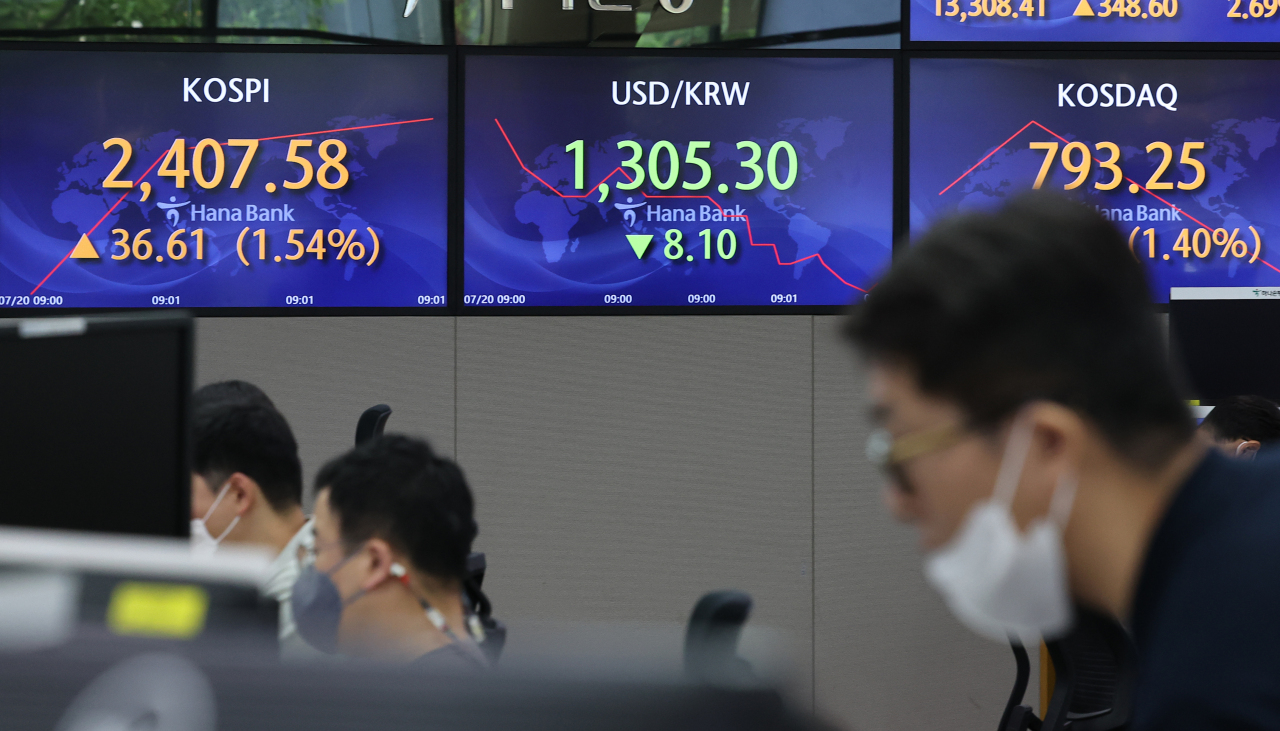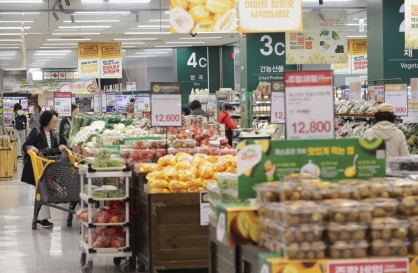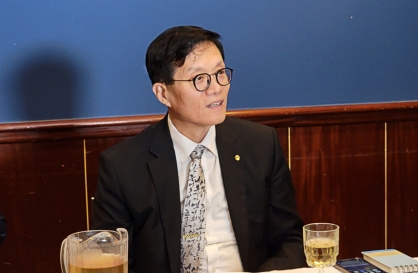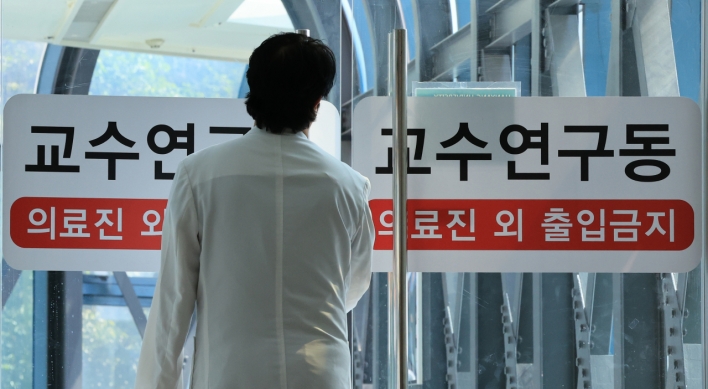Won gains after Yellen’s visit, weakening preference in safe havens
By Kim Yon-sePublished : July 20, 2022 - 15:45

SEJONG -- The Korean currency gained against the US dollar on Wednesday, a day after finance ministers from South Korea and the US said they could take actions like supplying liquidity for stabilization of the foreign exchange market.
The price of the Korean currency climbed by 0.5 won per dollar from a trading session earlier to close at 1,312.9 won.
After peaking at 1,326.1 won last Friday, the greenback fell for the third consecutive trading session.
This could be attributable to a sentiment recovery in global investors’ preference for risky assets on the back of robust earnings posted by major US businesses, according to brokerage firm-based analysts.
In addition, the agreement on Tuesday between Korea’s Finance Minister Choo Kyung-ho and US Treasury Secretary Janet Yellen is estimated to have somewhat affected the Korean currency’s gain.
The Finance Ministry said the two ministers agreed to closely cooperate in helping stabilize the foreign exchange market. It said that the two sides “have the ability to implement various cooperative actions, such as liquidity facilities, if necessary.”
Kiwoom Securities research analyst Kim Yoo-mi said: “The sentiment of investors’ preference for safe havens has weakened in the financial market, as stocks listed on the US bourses gained.”
An NH Futures analyst said that the remarks signaling possible preemptive measures in the foreign exchange market between Choo and Yellen would likely provide the won-dollar exchange rates with favorable conditions, though there was no particular comment on a currency swap deal between the two sides.
The dollar, which fell to the 1,100-won range in late 2020, continued to spiral over the past 1 1/2 years amid the US economy’s fast recovery during its pandemic normalization period.
Further, a critical glitch in global supply of raw materials as well as the war between Ukraine and Russia fanned a strong dollar this year amid a growing preference for safe havens.
Korean policymakers actively intervened in the foreign market in the second quarter of 2022 to curb the won’s sharp depreciation, by conducting verbal interventions or by reportedly selling dollar-denominated assets.
Nevertheless, the Korean currency eventually fell to the psychological barrier of 1,300 won per dollar in late June, and mostly traded over 1,300 won in July.
The cheap won has fanned inflation over the past few months, as the nation suffered a spike in import prices of raw materials involving crude.
It has also weakened the purchasing power of Koreans overseas, while more and more people have begun taking overseas trips amid normalization from the COVID-19 pandemic.
For the export sector, the won’s weak position might raise price competitiveness on the global stage. But market insiders say that exporters could suffer losses or weakening productivity from spiraling import prices of raw materials, which are used for their processed goods.
Under these economic conditions, Korea has been suffering a continuous trade deficit despite brisk outbound shipments, with the nation seeing an all-time high trade deficit of $10.3 billion in the first half of 2022.
By Kim Yon-se (kys@heraldcorp.com)
The price of the Korean currency climbed by 0.5 won per dollar from a trading session earlier to close at 1,312.9 won.
After peaking at 1,326.1 won last Friday, the greenback fell for the third consecutive trading session.
This could be attributable to a sentiment recovery in global investors’ preference for risky assets on the back of robust earnings posted by major US businesses, according to brokerage firm-based analysts.
In addition, the agreement on Tuesday between Korea’s Finance Minister Choo Kyung-ho and US Treasury Secretary Janet Yellen is estimated to have somewhat affected the Korean currency’s gain.
The Finance Ministry said the two ministers agreed to closely cooperate in helping stabilize the foreign exchange market. It said that the two sides “have the ability to implement various cooperative actions, such as liquidity facilities, if necessary.”
Kiwoom Securities research analyst Kim Yoo-mi said: “The sentiment of investors’ preference for safe havens has weakened in the financial market, as stocks listed on the US bourses gained.”
An NH Futures analyst said that the remarks signaling possible preemptive measures in the foreign exchange market between Choo and Yellen would likely provide the won-dollar exchange rates with favorable conditions, though there was no particular comment on a currency swap deal between the two sides.
The dollar, which fell to the 1,100-won range in late 2020, continued to spiral over the past 1 1/2 years amid the US economy’s fast recovery during its pandemic normalization period.
Further, a critical glitch in global supply of raw materials as well as the war between Ukraine and Russia fanned a strong dollar this year amid a growing preference for safe havens.
Korean policymakers actively intervened in the foreign market in the second quarter of 2022 to curb the won’s sharp depreciation, by conducting verbal interventions or by reportedly selling dollar-denominated assets.
Nevertheless, the Korean currency eventually fell to the psychological barrier of 1,300 won per dollar in late June, and mostly traded over 1,300 won in July.
The cheap won has fanned inflation over the past few months, as the nation suffered a spike in import prices of raw materials involving crude.
It has also weakened the purchasing power of Koreans overseas, while more and more people have begun taking overseas trips amid normalization from the COVID-19 pandemic.
For the export sector, the won’s weak position might raise price competitiveness on the global stage. But market insiders say that exporters could suffer losses or weakening productivity from spiraling import prices of raw materials, which are used for their processed goods.
Under these economic conditions, Korea has been suffering a continuous trade deficit despite brisk outbound shipments, with the nation seeing an all-time high trade deficit of $10.3 billion in the first half of 2022.
By Kim Yon-se (kys@heraldcorp.com)



![[AtoZ into Korean mind] Humor in Korea: Navigating the line between what's funny and not](http://res.heraldm.com/phpwas/restmb_idxmake.php?idx=644&simg=/content/image/2024/04/22/20240422050642_0.jpg&u=)





![[Herald Interview] Why Toss invited hackers to penetrate its system](http://res.heraldm.com/phpwas/restmb_idxmake.php?idx=644&simg=/content/image/2024/04/22/20240422050569_0.jpg&u=20240422150649)







![[Herald Review] Xdinary Heroes kicks off five-month-long project with solo concert, teases new album](http://res.heraldm.com/phpwas/restmb_idxmake.php?idx=652&simg=/content/image/2024/04/22/20240422050539_0.jpg&u=20240422152154)
![[Today’s K-pop] Illit logs 100m Spotify streams with debut song](http://res.heraldm.com/phpwas/restmb_idxmake.php?idx=642&simg=/content/image/2024/04/22/20240422050650_0.jpg&u=)